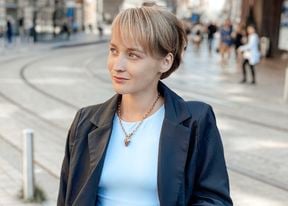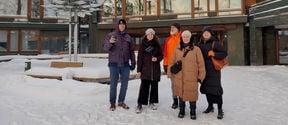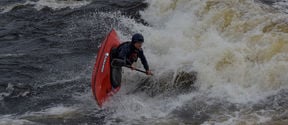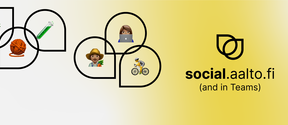Doctoral education
Everything there is to know about doctoral education for doctoral students, supervising professors and thesis advisors.

My doctoral research is about using smart materials for medical applications. Specifically, I am using shape-changing polymers to develop a new type of brain implant that can be potentially used for treating epilepsy in the short run, or for advanced brain-computer interface applications in the long-term future.
I have always been interested in human brain and solving issues that can bring a greater impact to society. This was my driving force when I decided to pursue this relatively difficult topic which had no background and was not previously studied in my research group. I had to build my own network and find people who were not afraid of challenges, which medical engineering always faces.
I started considering a PhD right on the first day of my master’s program in Translational Engineering in Health and Wellbeing. I had graduated from polytechnical university as electronics engineer and worked several years in R&D companies. However, I always wanted to switch from electronics to the biomedical engineering field and the master’s program gave me that chance. I became immediately fascinated by the courses taught and realized I wanted to go deeper into the field. Some months later I ended up as a research assistant and stayed at university since then.
Anastasiia KravtcovaIn doctoral studies students utilize their full potential and knowledge towards solving important and challenging issues
I think it’s hard to compare master’s and doctoral studies. During the master’s period, one mostly acquires knowledge. At least in engineering schools, doctoral studies are not really about courses. In practice, doctoral students need to complete only 40 credits-worth of courses, which can be done in a few months. The remaining time is spent on research.
In doctoral studies students utilize their full potential and knowledge towards solving very important and challenging issues. We are doing science, aiming to publish as many papers as possible and can really make an impact on society and even humanity.
To me, the best thing about a doctoral studies is the possibility to realise your dreams. We have few boundaries, especially in technical schools. It is possible to select from a wide variety of research directions, and it is very easy to go in another direction during your doctoral studies. Another great part of doing a PhD is the community. When one has challenges, or cannot find the answer to a question, there are always people around who will do their best to help and support you.
University is a perfect place for achieving a broader impact: we have very advanced equipment, the scientific community is a great environment for sharing experiences, and there are many funding opportunities available—which is very important. Thus, for some people, doctoral studies might become a combination of a job, hobby, and lifestyle for several years, which is great.
I attended an international summer school in Denmark at the beginning of my doctoral studies. It was scientifically very interesting and useful—it always broadens your mind when you see how other people do things. I had a research visit with collaborators in Belgium planned for 2020, but it was cancelled due to the Corona crisis. I still look forward to it once we can travel freely again.
I have attended large conferences in Boston, Nice and Berlin. All the conferences I attend are very large—with over 2,000 participants, and full of information, important contacts, and know-how. In conferences I most value the opportunity to introduce my research to a broader audience and get feedback right away, as well as networking, which might be even more useful in the long run. Very often the contacts you make at a conference evolve into solid collaboration.
Anastasiia KravtcovaDoing a PhD requires passion and inspiration, so I suggest going into a research field you are really interested in.
In general, there are two options after a PhD—stay in academia or go into industry. Initially, I was considering staying in academia for research and probably teaching work. However, over the years I started to see some benefits in working in companies or creating one of my own. So basically, I will rely on the opportunities I have after graduation since there are pros and cons on both paths. In the end, we don’t have to decide our future once and for all.
Doing a PhD requires passion and inspiration, so I suggest going into a research field you are really interested in. Take your time to find a research direction that will motivate you for several years. And as you start your research, start building your network and work constantly on expanding it. This will greatly benefit your research.
Do you want become an expert in your field? The Doctoral Program in Electrical Engineering offers you the opportunity to conduct high-quality research in a multidisciplinary and international environment.

Everything there is to know about doctoral education for doctoral students, supervising professors and thesis advisors.



